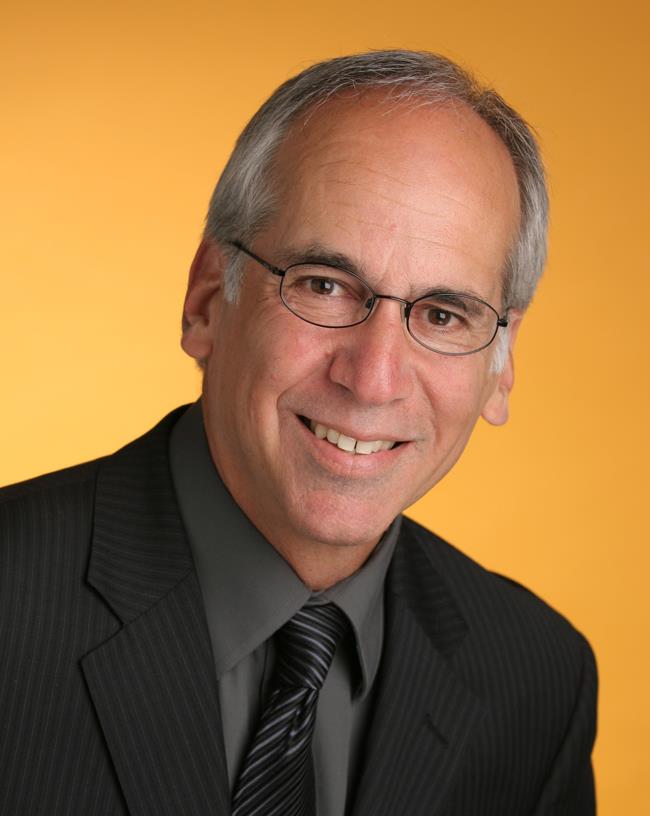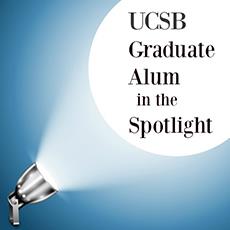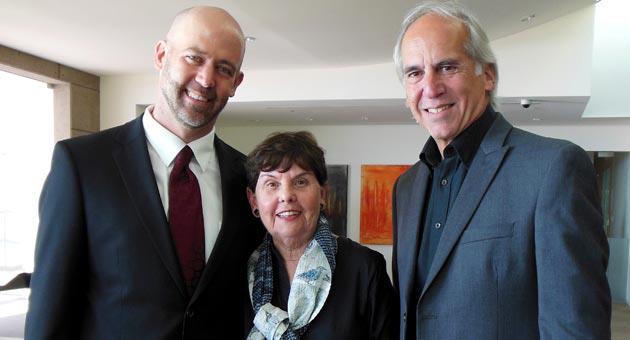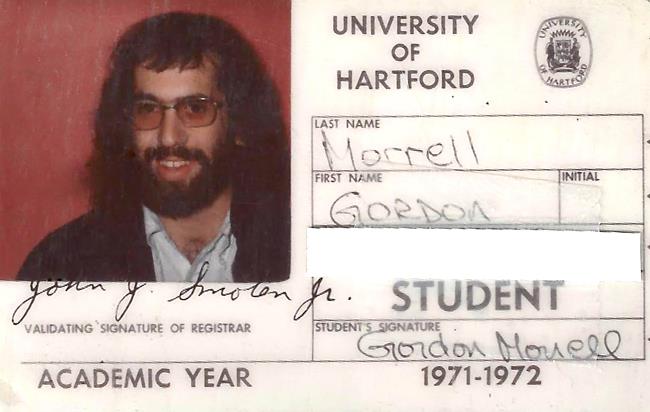Top Stories
When Gordon Morrell earned his Education Ph.D. in 1976, his career path took a few twists and turns. After an early career as a professor, in 1990 he joined asset and property management software solutions provider Yardi Systems in Goleta, where he has worked since, currently as its Executive Vice President and Chief Operating Officer.
 Gordon Morrell has been juggling roles for decades, going back to his days as an Education Ph.D. student at UCSB in the 1970s. At that time, in the halls outside their tiny graduate student offices in what is now the Hosford Clinic, he and several of his cohorts would take breaks from their studies and do a little three-ball juggling.
Gordon Morrell has been juggling roles for decades, going back to his days as an Education Ph.D. student at UCSB in the 1970s. At that time, in the halls outside their tiny graduate student offices in what is now the Hosford Clinic, he and several of his cohorts would take breaks from their studies and do a little three-ball juggling.
"We actually got to the point where we could pass to each other," Morrell recalled with a laugh, adding: "It was a stress breaker; it was like a little relief." In explaining why this routine was helpful for the grad students, he said, "You have to really focus when you're juggling. You can't be thinking about other things. So maybe it's just a good way to get your mind off what you're doing."
That focus and work-life balance has served Morrell well. Born in Brooklyn, N.Y., and raised along with his older brother in Goshen, a small farming town north of New York City, he earned his Education Ph.D. (Counseling Psychology emphasis) in three years at UCSB. "I went straight through from kindergarten to Ph.D.," he said. "There were no breaks." He put himself through college by singing and playing guitar in such local venues as The Feed Store restaurant and bar in Santa Barbara (no longer in existence); SOhO; and Cold Spring Tavern.
 Morrell's career path would end up taking a few twists and turns. As a teenager in his hometown, he sold milk at a dairy farm and was a stable boy at the local horse racing track. After college, he was a university professor in Maine; a county director of childcare services in Santa Barbara; and the founder of a Santa Barbara educational software development company. In 1990, he joined asset and property management software solutions provider Yardi Systems in Goleta, where he has worked since, currently as its Executive Vice President and Chief Operating Officer.
Morrell's career path would end up taking a few twists and turns. As a teenager in his hometown, he sold milk at a dairy farm and was a stable boy at the local horse racing track. After college, he was a university professor in Maine; a county director of childcare services in Santa Barbara; and the founder of a Santa Barbara educational software development company. In 1990, he joined asset and property management software solutions provider Yardi Systems in Goleta, where he has worked since, currently as its Executive Vice President and Chief Operating Officer.
Morrell is on the management team of a company with 3,300 employees and more than 30 offices in North America, Europe, Asia, and Australia. The company website says Morrell "is responsible for protecting Yardi Systems' corporate and fiscal interests and maintaining operations." But he will tell you that "maintaining operations" sometimes means getting down on hands and knees to tighten a loose foot screw or seeing that a coffee spill is cleaned up. "It's sort of a humbling experience," Morrell said. "But I don't mind it. It's just fine."
Morrell emphasizes that as a 23-year employee of Yardi, "this is a fulfilling job for me." He also finds his nonprofit work, both through the company and outside of it, rewarding. Yardi is actively involved in supporting nonprofit community organizations with projects related to such areas as the arts (including UCSB's Arts & Lectures); sustainability; education for disadvantaged youths; and social services. Morrell reads proposals and works with others in the company to decide which projects to fund. "We're very proud of the amount of nonprofit work that we do through the company," he said. Outside of Yardi, he is proud to chair the advisory board of public radio station KCLU and work on activities for the nonprofit community foundation The Fund for Santa Barbara.
 After Gordon the graduate student earned his Ph.D. from UCSB in 1976, "I remember really missing being on the East Coast." So he returned, figuring that his career future would be as a counseling professional or as a university professor. Little did he know then that he would end up back in Santa Barbara, not in the Education field, but as a long-serving top executive at a growing and successful global software company.
After Gordon the graduate student earned his Ph.D. from UCSB in 1976, "I remember really missing being on the East Coast." So he returned, figuring that his career future would be as a counseling professional or as a university professor. Little did he know then that he would end up back in Santa Barbara, not in the Education field, but as a long-serving top executive at a growing and successful global software company.
We sat down for an interview with Dr. Morrell, who shares his biggest accomplishments; how he transitioned from the education field to the computer software field; his insights for grad students entering the job market; the special distinction he held when he was a university professor; and more. Read on. ...
Education and degrees
Ph.D., Education, Counseling Psychology emphasis, UC Santa Barbara, 1976
M.Ed., Counseling emphasis, University of Hartford (Connecticut), 1973
B.A., Liberal Arts, American Studies, Syracuse University (New York), 1971
How was it that you came to UCSB for graduate school?
In 1972, Ray Hosford and Jules Zimmer [later the Dean of Gevirtz School] came out to the University of Hartford to conduct a three-week summer program. Dr. Hosford asked if I would be interested in studying at UCSB. I took one look at the photo of the UCSB Lagoon and made up my mind quickly.
What was graduate school like for you? What kind of a student were you when you were at UCSB?
My recollection is that grad school was a good combination of fun and hard work. Remember that this was the mid-70s and there were lots of interesting things going on, with California and UCSB in the forefront. I was from the East Coast so all of this was new to me. I'm guessing that most of my professors (besides my committee members) couldn't answer the question of the type of student I was. I don't think I was stellar, nor was I going to do anyone any harm. I was in the program for less than three years, so either I was very focused, or they decided to get me out of there to make room for some real students. One thing I learned in school: how to do three-ball juggling.
Please tell us a little bit about your UCSB dissertation and research.
I was looking at correlations between diet and behavior of children. We worked with low-income populations in Santa Barbara schools where we could see what the students were eating for breakfast through the Head Start program. And we developed a measurement test to assess reactions to specific questions, as a supplement to teachers' records, etc. Much of this is taken for granted today, but we were testing to see if high-sugar intake would have a different effect than high-protein breakfasts. Our research pretty much verified the common-sense thinking that the low-sugar breakfasts helped kids stay a little bit calmer and stay focused and they were generally doing better in school.
What was your first job out of graduate school and how did you get it? Also, how did you make that transition from Education to computer software?
I graduated in August, 1976, and left Santa Barbara shortly afterward, driving east in our '67 VW Bus with my wife, Sheila, our dog, our cat, three rabbits, and a small ficus plant. The rabbits ate the plant along the way, but we wound up in Connecticut a week later. I took a part-time teaching job at a community college, and a month later was offered a job running the Child Development program for the city of Enfield, Connecticut. A week before that job was to start, I applied for, interviewed, and was offered my dream job: teaching at Nasson College, a small liberal arts college in Sanford, Maine. So off we went, in January, 1977, to start a new life in Maine.
Three months into that job, the professor who hired me told me that Nasson was having financial problems (it has since closed) and I should get out if I could. I applied for, interviewed, and was offered a job at the University of Maine in Gorham, teaching Human Development in the undergrad division, and Counseling in the grad school. At age 27 I was the youngest Assistant Professor at the university, and along with my California degree was also something of a novelty.
But Sheila is a 6th-generation Californian, and after a couple of blizzards, two winters, and one child later, we decided to move back to Santa Barbara. Jules Zimmer had introduced me to some people at the Office of the County Superintendent of Schools, and in July, 1979, I became their Director of Child Development Programs. This was right at the birth of the personal computer scene. I worked on trying to computerize some of our record-keeping systems, and that led to the publication of a book on how to select the right computer called "Computer-Ease" in 1982. I left the County Schools office a year later to start my own company, Santa Barbara Softworks, which developed educational software for elementary and high school students. Two of our programs (Alge-Blaster and Grammar Gremlins) were top 10 best-sellers in the country for educational software.
But the computer industry grew quickly and so did my children. In 1990 I decided to look for work with another company, and more security, and today Santa Barbara Softworks lives on only at the front of one of my old T-shirts.
Briefly describe your current job at Yardi and what it entails. What do you like most about your job and what do you like least?
I began working at Yardi Systems in March, 1990, when we had about 25 people. As the Chief Operating Officer I am responsible for the day-to-day operations of a 3,300-employee company. Here are a few things I like most:
a) I get to work with terrific people every day.
b) We are able to support nonprofit organizations all over the world.
c) My job changes from hour to hour. I might be negotiating a contract for the acquisition of another company, and an hour later might be called on to help fix an overflowing toilet. It's all quite humbling.
And here's what I like least: Sometimes people won't report that overflowing toilet!
What does Yardi look for in the UCSB students it hires?
We've got so many different positions that open up here, so that's a tough question to answer. I know that we have hired from Computer Science, journalism, and the Bren School, among others. We really look more at the individual and not necessarily so much at their background or what discipline they came from. Because there's so much variety in the different types of jobs that are available here.
In what ways did UCSB, specifically your graduate education, prepare you for your career?
As a graduate student, you have to be disciplined and you have to take responsibility for the work that you do. You need to be able to communicate succinctly and clearly. These traits definitely have helped in my career. More specifically, the counseling skills I learned, being able to listen, respond, and help, are skills I use in my job every day.
Do you have any job search or job interview tips you'd like to share with our grad students? Anything you think will help a grad student stand out as a job seeker with potential employers?
Research and understand the company and the position you are seeking. Listen carefully to questions and answer honestly. Stay present and don't worry about things far in the future.
In job interview and job application situations, what mistakes or faux pas do grad student applicants make?
Candidates can focus too much on selling themselves and not listening to the interviewer's questions. It's a fine line, because of course you want to impress the interviewer. But if you prepare by understanding what the company does, and what the job entails, the rest will take care of itself. Tread lightly with questions like "Is there room for advancement in the company?" This can be seen as a sign that you would not be satisfied with the position being offered, and you will be looking elsewhere.
What strengths do you think a Ph.D./M.A. student would bring to an employer?
People who graduate from Ph.D./M.A. programs have demonstrated their ability to study subjects, and to be focused and disciplined enough to follow through with the program. These are great skills for any position.
Who has been and/or is a hero, mentor, role model, or inspiration to you?
I've been very fortunate to be able to be with some wonderful people in and away from school and work. The inspirations can come from watching the smallest struggles to the biggest visions. The former Dean of the Graduate School of Education, Dr. Jules Zimmer, has always been an inspiration. At the University of Maine I was asked to team-teach with D.D. Moore, who continues to be a mentor. And I would not have stayed at Yardi Systems for these years without continued inspiration from Anant Yardi, who started the company in 1982.
What do you consider to be your biggest accomplishment or something you are the most proud of?
 I was a campus radical at Syracuse in the 1960s. In those days I never saw myself as one who would "settle down" as I got older. But here I am: married to Sheila for 37 years, in the same house in Santa Barbara for 34 years, and in the same job for more than 23 years. Definitely an accomplishment. But I'm most proud of our two fantastic daughters and the fact that all of us, including our two young grandchildren (both born this year) can enjoy hanging out together. On the work front, I am very proud to participate in the nonprofit program at Yardi. We support more than 60 groups worldwide.
I was a campus radical at Syracuse in the 1960s. In those days I never saw myself as one who would "settle down" as I got older. But here I am: married to Sheila for 37 years, in the same house in Santa Barbara for 34 years, and in the same job for more than 23 years. Definitely an accomplishment. But I'm most proud of our two fantastic daughters and the fact that all of us, including our two young grandchildren (both born this year) can enjoy hanging out together. On the work front, I am very proud to participate in the nonprofit program at Yardi. We support more than 60 groups worldwide.
What's on your bucket list of things to do that you haven't done?
Come on ... I'm not old enough for a bucket list, am I?
What is something that very few people know about you or that would surprise people about you?
Here are a few things:
a) I chair the advisory board of the best radio station around: KCLU public radio.
b) Spent many years playing guitar and singing in bands, up to just a few years ago.
c) Was the auctioneer earlier this month for the Fund for Santa Barbara's Bread and Roses.
d) Introduced, as Ed Sullivan, a Beatles tribute band at our recent user conference in Anaheim.
e) Have been learning to make old-school cocktails (Old Fashioneds, martinis, Manhattans, Dark 'n' Stormys, Negronis) - lots of fun when people come to visit.
f) I have been riding a Vespa to work for the last 10 years.
What do you do for fun or relaxation?
My guilty pleasure is an evening soak in our redwood hot tub, something I do a few nights a week to relax. Sheila and I have a house in Maine where we now spend a couple of months every summer. We try to get out on our kayaks a few days a week and I love to get out for long walks, listening to NPR podcasts along with the wildlife. In Santa Barbara I try to get out on my bike at least once a week.
Is there anything else you'd like to add?
I'm a very lucky guy. UCSB gave me a great launch into the "real" world. I thought my future would be in the counseling profession, or at least in teaching at the university level. It's a lesson in understanding that what you study - what you major in - might not necessarily determine your future career arc. That's a great lesson to understand because once you get that, you become open to a whole new universe.